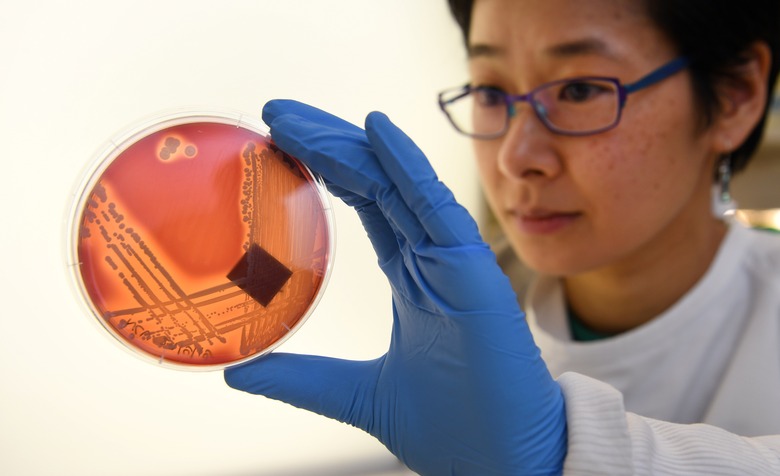Why Superbugs Are So Scary
Turn on any news station and you probably won't have to wait too long to hear about coronavirus, the epidemic that has killed over 300 people in China, and affected people around the world — including in the United States.
So, it's safe to say that scary microbes, or "bugs," are top of mind nowadays. And while a scary, relatively new virus catches headlines, the world has another major "bug" problem: antibiotic resistance, which creates almost impossible-to-kill bacteria, which some people call superbugs.
So What Are Superbugs, Anyway?
So What Are Superbugs, Anyway?
In a nutshell, superbugs are bacteria that aren't killed by traditional antibiotics: the type of drugs your doctor would probably prescribe you if you came in with a bacterial infection. Superbugs can develop over time, due to genetic mutations that make antibiotic drugs no longer work.
Sound confusing? Here's how it works. Any cell, including bacteria, can develop genetic mutations at any time. Most of those mutations might have no real effect on how the organism works, while other genetic mutations can have positive or negative effects on the organism.
So let's say you've got a bacterial infection. Your doctor prescribes antibiotics, which work by killing the offending bacteria, right? Well yes — as long as they're not immune. When one of those bacteria develop a mutation that mean the drug no longer works, it can survive after treatment. What's more, since the antibiotics wiped out all the "normal" bacteria — the ones that aren't resistant — that new, resistant bacteria has plenty of room to grow. Then you've got a big problem, because you've got a growing infection that just keeps going, even when you're on antibiotics.
Superbugs take this step to the extreme. They've undergone enough mutations that they're resistant to most or all of the commonly-used antibiotics. That means people infected with superbugs might not be able to get treatment.
What Causes Superbugs?
What Causes Superbugs?
On the most basic level, superbugs are simply caused by random genetic mutations that create drug resistance. But, of course, there's more to it than that. See, the more bacteria are exposed to antibiotics, the greater the chance that one stray microbe will develop resistance, and start on the path to becoming a superbug.
So, irresponsible or overuse of antibiotics contributes to superbugs. Bacteria in our waste water can also evolve in the superbugs, while overuse of antibiotics in agriculture seems to up the risk of superbug development. Superbugs also naturally tend to be found in places where antibiotics and disinfectants are commonly used — like in hospitals.
What Can Scientists Do About Superbugs?
What Can Scientists Do About Superbugs?
The idea of completely (or almost completely) incurable infections is scary, which is why experts in a range of scientific fields are working to protect you. Veterinary experts, for instance, can help encourage responsible use of antibiotics in agriculture, while family doctors can order testing to make sure they only prescribe antibiotics when it's truly appropriate.
Of course, researchers are also working to understand more about how antibiotic resistance develops, and track the evolution of superbugs to try and anticipate (and avoid!) epidemics. And other researchers are working on new antibiotic medications that might work better against superbugs than our current options.
How Can You Protect Yourself From Superbugs?
How Can You Protect Yourself From Superbugs?
Superbugs are generally rare — so you don't need to worry about them in your day to day life — but you can still take steps to protect yourself. Make sure you're up to date on vaccinations, since you might be more vulnerable to superbugs if you're already sick with, say, the flu. Wash your hands thoroughly to help remove bacteria.
And practice responsibility with your antibiotic use, too. Let your doctor run the appropriate tests to see if antibiotics will really help you, rather than insisting on a prescription. And if you do get antibiotics, make sure you take them exactly the way your doctor tells you to. This both helps prevent superbug development, and ensures the drug can actually treat your infection.
Cite This Article
MLA
Tremblay, Sylvie. "Why Superbugs Are So Scary" sciencing.com, https://www.sciencing.com/why-are-superbugs-scary-13724292/. 2 February 2020.
APA
Tremblay, Sylvie. (2020, February 2). Why Superbugs Are So Scary. sciencing.com. Retrieved from https://www.sciencing.com/why-are-superbugs-scary-13724292/
Chicago
Tremblay, Sylvie. Why Superbugs Are So Scary last modified August 30, 2022. https://www.sciencing.com/why-are-superbugs-scary-13724292/
